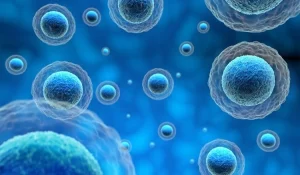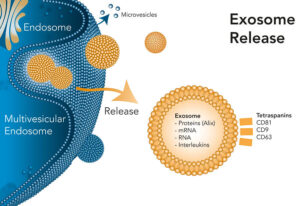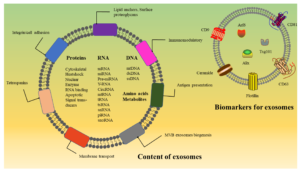Exosome Therapy: An Emerging Research Area in Regenerative Medicine (2023)

In recent years, a new dimension has been added to stem cell therapy with the discovery of cell-derived exosomes. These tiny vesicles, also called extracellular vesicles, are secreted by virtually all human cells, including stem cells and specialized cells such as dendritic cells. They are encased in cell membranes and carry a variety of biological materials, including proteins, lipids, and nucleic acids, from their donor cells to recipient cells.
Exosomes are believed to play a crucial role in cell biology, particularly in cell-to-cell communication. They can deliver their cargo to target cells, influencing their function and behavior. This property has sparked interest in the potential use of exosomes in medical treatments, both as therapeutic agents themselves and as drug delivery vehicles.
In a clinical trial context, exosomes derived from hMSCs have shown promise in treating various conditions, from infectious diseases to degenerative disorders. Their ability to deliver growth factors and other regenerative substances directly to damaged tissues could revolutionize current treatment approaches. However, much remains to be understood about the biology and therapeutic potential of exosomes, and further research is needed to fully realize their potential in stem cell therapy and beyond.

Definition and Overview of Exosome Therapy
Exosome therapy is a burgeoning field in the realm of regenerative medicine. It pertains to a therapeutic approach that capitalizes on the biological functions of exosomes. Exosomes are minuscule, membrane-bound vesicles, alternatively referred to as extracellular vesicles, secreted by a majority of cell types within the human body. These vesicles transport genetic information, proteins, and other biological materials from their parent cells to recipient cells, thereby facilitating intercellular communication and influencing a variety of biological functions.
The Role of Exosomes in Regenerative Medicine
In the context of regenerative medicine, exosomes derived from mesenchymal stem cells (MSCs) have been the subject of extensive research due to their potential therapeutic applications. These MSC-derived exosomes have been shown to promote tissue regeneration, modulate immune responses, and enhance the healing process, among other functions. Their ability to cross the blood-brain barrier also opens up potential avenues for the treatment of neurodegenerative disorders.
Understanding Exosomes: Formation and Function
Exosomes are formed within the cell in an endosomal compartment known as the multivesicular body (MVB). Upon fusion of the MVB with the plasma membrane, exosomes are secreted into the extracellular environment. The biological function of exosomes is primarily determined by their protein composition and the nucleic acids they carry, which reflect the physiological state of the parent cell.

The Composition of Exosomes
Exosomes are composed of a lipid bilayer membrane that encapsulates a variety of biological materials, including proteins, lipids, mRNA, miRNA, and other non-coding RNAs. The protein composition of exosomes can include membrane transport and fusion proteins, tetraspanins, heat shock proteins, and others. The lipid composition of exosomes is also distinct and includes cholesterol, ceramide, and sphingolipids.
Cellular Physiology of Exosomes
In terms of cellular physiology, exosomes play a crucial role in cell-to-cell communication. They can transfer their cargo to recipient cells either by direct fusion with the cell membrane or by endocytosis. This transfer of materials can influence the biological function of the recipient cell, affecting processes such as immune activation, cell proliferation, and cell differentiation.
Characterization of Exosomes
The characterization of exosomes involves several techniques, including nanoparticle tracking analysis, flow cytometry, and electron microscopy. These techniques allow for the determination of the size, concentration, and protein composition of exosomes, which are critical parameters in the context of exosome therapy.
The Therapeutic Potential of Exosomes
Exosomes carry genetic information and proteins that can serve as biomarkers for various diseases, including cancer, cardiovascular diseases, and neurodegenerative disorders. This diagnostic role of exosomes has been explored in numerous clinical trials, with promising results.
The therapeutic role of exosomes is primarily based on their ability to deliver specific biological materials to target cells. This property has been exploited in the development of exosome-based drug delivery systems, where exosomes are loaded with therapeutic agents and used to target specific cells or tissues.
Potential Therapeutic Applications of Exosomes
Exosomes have potential therapeutic applications in a wide range of medical conditions. For instance, exosomes derived from MSCs have shown promise in promoting wound healing, reducing scar tissue formation, and enhancing hair growth. In addition, exosomes have demonstrated anti-inflammatory properties, making them potential therapeutic agents for conditions characterized by chronic inflammation. Furthermore, the ability of exosomes to cross the blood-brain barrier suggests potential applications in the treatment of neurodegenerative diseases.
